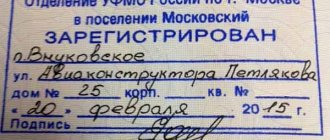Legal requirements
If the apartment is not privatized, can new residents be registered in it? Municipal housing is real estate that has a certain legal status.
In fact, it is the property of local governments .
Citizens are his employers, therefore, their rights are somewhat limited compared to owners of their own real estate.
Unlike registration in your own housing, the registration of which is carried out in accordance with the Civil Code, procedural issues for municipal housing are regulated by Article 70 of the Housing Code.
It is this document that contains the regulations for moving into and registering housing of this status. According to it, the employer cannot register a new tenant without the consent of all adult citizens who are already registered in the given territory.
At the same time, there are conditions under which the tenant may be refused registration for another tenant, if after that the share of each is less than ten square meters of living space.
The Housing Committee separately considers the issue of registering a newborn child or a new family member.
Registration by law in these circumstances involves changing the housing contract and adding new participants to it.
In addition to the residential complex, the registration procedure is regulated by Government Decree No. 713 of June 17, 1995 and Federal Law No. 5242-1. These documents define the procedure for submitting an application and provide a list of those responsible for its preparation.
Legislative basis for residence
Registration of residents in premises owned by the municipality is based on legislative acts that are regulated by general rules and regulations:
- By Decree of the Russian Government on July 17, 1995. The resolution has registration number 713 and does not make any division between privatized housing of owners and residential premises owned by the municipality.
- Federal Law No. 5242-I determines the persons responsible for registration records and establishes the rules governing the submission of applications.
- The regulations for the operation of registration services providing services to the public were legalized by Order No. 288 of the Federal Migration Service and signed by its leadership on September 11, 2012.
The document at the legislative level establishes a certain procedure for registering citizens, and also establishes deadlines for the registration procedure. - The rights, obligations, conditions and features of renting municipal housing, as well as the rules governing the registration procedure, can be found in articles from to 85 of the Housing Code of the Russian Federation.
Who can apply for registration?
Is it possible to register a person in a non-privatized apartment? the consent of those living in it can move in and, accordingly, register in residential premises owned by the municipality . The difference from your own home is only in the restrictions on living space and the procedure for carrying out the procedure.
Who can be registered without the consent of the residents? How can you register in such an apartment if you are not a relative?
If the person registering is a relative of the tenant or any family member living in the area, it is enough for him to obtain the consent of all residents.
Since 2009, registration of relatives does not even require taking into account the area norm . In other words, anyone can register for municipal housing if the employer or members of his family declare that this is their relative.
If the person being registered is the spouse or parent of the responsible tenant, his registration is carried out according to a simplified procedure, without obtaining the permission of the other registered persons. At the same time, the administration makes changes to the social tenancy agreement.
To register an outsider, in addition to the consent of the residents, permission from the local administration that owns the property is required. At the same time, the authorities have the right to refuse if after this the size of the living space for each resident is less than 10 meters.
Registration of a person in a non-privatized apartment
Registration in an apartment owned by the municipality is carried out using the social tenancy method , a method of drawing up an agreement between the owner and the tenant, implying the permanent use of the premises provided to the tenant.
A signed agreement with the owner of a residential building, which is one of the municipalities, provides the opportunity for the tenant of the living space to register on it himself, as well as register family members.
Important! Persons registered in such premises have the same rights to reside in the apartment provided for by law, as well as the same responsibilities for timely and proper payment for utilities provided to them and for carrying out repairs on the premises.
We discussed in more detail the rights that registration in an apartment gives a person in this material.
Rights and responsibilities of a new tenant
When deciding to add a new tenant to municipal housing, residents need to take into account that he will acquire equal rights with them.
He, along with other residents, will be able to perform the following actions:
- Moving minor children into an apartment without the permission of those registered.
- Obtain alternative municipal living space in case of emergency, resettlement or exchange.
- Participate in the privatization of living space.
- Move in family members if you receive permission to do so from other employers.
Most often, these circumstances are the reason why some employers disagree with the registration of a new person, because their share in the living space is significantly reduced .
In addition to rights, a new tenant also has a number of responsibilities :
- The new tenant is required to participate in paying for housing and communal services.
- Perform repair and maintenance activities.
For this reason, you can get a refusal from authorities who do not want to register unreliable citizens in their own living space.
For residents, the registration of a new tenant can result in unpleasant consequences if he has loan debts.
By law, bailiffs can arrest and even seize any property in an apartment to pay off a debt. In this case, residents will have to prove that the property belongs to them.
Registration of a minor citizen in the territory of residence of one of the parents is carried out without taking into account the opinions of other residents. Authorization is also not required.
Rights that registration gives
Registration at the place of residence in Russia is advisory in nature. But its absence is an offense and is punishable by an administrative fine. This essentially makes registration mandatory. There are quite strict conditions for registration deadlines. If you change your registration, you are given 7 days to register at the new address.
For exceeding this period, the Office of the Federal Migration Service (FMS) issues a fine. As you can see, the state takes a citizen’s registration at the place of residence very seriously.
Registration is required in almost all areas of a person’s life. You will be required to register a residence permit when applying to a district clinic, when applying for a job, when opening a bank account, when obtaining a driver’s license, etc.
What rights and opportunities does registration give?
- receive free medical care in your area of residence;
- get a place in a kindergarten or school on a territorial basis;
- Confirm the place of registration for the employer, bank and any other organization that requires registration.
- obtain a TIN certificate, SNILS, medical policy, driver’s license and other documents;
- receive social benefits and payments.
Citizens who have a residence permit in a non-privatized residential area have the rights:
- live in this residential area;
- register your relatives and children;
- participate in the privatization of the residential area where he is registered;
- exchange for other non-privatized housing;
- sublease living space;
- give permission for registration to new residents.
When participating in the privatization of municipal and departmental housing, numerous questions and controversial situations may arise. To resolve them, experienced specialists will be required. On our website you will always be given comprehensive advice on issues of housing privatization.
Residents of non-privatized apartments, along with rights, also have responsibilities:
- use the residential premises for its intended purpose;
- pay rent;
- keep the living space in good condition.
Regulations
To register, you need to go through the following steps:
- Obtain written consent from the landlord if you are not a relative of those living in the apartment.
- Submit an application (Form – 6) to the FMS department on whose territory the apartment is located. In addition to the one being registered, a statement of consent must be written personally by everyone living in the apartment.
- Provide the required package of documents :
- passport;
- departure slip;
- military ID (if available);
- certificate from the administration about family composition;
- rental agreement;
- birth certificate (for a citizen under 14 years of age).
A child over 14 must attend in person.
Who can be registered?
The law provides for registration of two categories of citizens:
- Relative . When it comes to a minor child, spouse or parents, they are given priority registration rights. A child whose parents already live in this living space is registered immediately, without taking into account sanitary standards for the density of the apartment. If we are talking about spouses or parents, sanitary standards are taken into account, and the consent of all registered residents in the living space is taken into account. The second line includes other relatives: grandparents, sisters or brothers, aunts or uncles, nephews, cousins, etc. At the same time, sanitary standards and the consent of registered residents are also taken into account. If the court finds that one of the relatives who wants to register is helpless and incompetent, then it can oblige their relatives to register such people without obtaining consent (for example, elderly grandparents or relatives with extremely limited capabilities due to health) .
- Stranger person . You will need to obtain permission from the municipality or the organization that owns the property. These people should have the right to be registered.
Where to apply?
Where to apply for registration in a municipal apartment? Depending on the form of management of an apartment building, you need to contact the housing department, homeowners association or other authorities that have a passport office .
If necessary, staff will recommend to you which organization you need to obtain additional certificates or permits for registration.
In addition, you can start the procedure at the MFC or through the State Services portal. To begin with, employees need to provide originals and copies of all of the above documents. The application, together with the applicant for registration, must be submitted personally by everyone registered in the apartment.
If one of those registered is temporarily absent, you will have to wait for his arrival. You can also use a notarized one-time power of attorney or obtain consent from a notary at your place of residence for the time being.
application in any form. At the same time, the address of the property and information about the responsible tenant are accurately indicated.
The stamp in the passport is placed exclusively in the department of the Federal Migration Service . Therefore, after checking the documents, you will be invited to receive documents from this organization.
Features of non-privatized housing
As Art. 125 property rights and obligations on behalf of the state and municipalities are assigned to public authorities within the framework of their competence. Ownership of residential real estate is confirmed by the relevant register of federal, state and municipal property.
Management of these objects is distributed as follows:
- Government of the Russian Federation: objects that are in federal ownership;
- republican, regional, regional administrations, administrations of autonomous regions, districts, cities of federal significance: state-owned housing stock;
- Administration of urban and rural settlements, other municipalities: objects in municipal ownership.
Employers often ask whether it is possible to register a person in a non-privatized apartment. The current legislation does not provide for any prohibitions on such registration, therefore, with the consent of all persons living in a given living space, everyone has the right to registration.
Timing and cost
Currently, this procedure has become absolutely free .
Housing department or HOA employees can only offer to fill out documents for a fee; this requires your consent.
A citizen can refuse the service and complete all paperwork independently using the provided samples.
Employees of the organization are required to provide you with samples of filling out all the necessary forms. Registration deadlines range from 3 to 7 days , depending on the organization to which you submitted documents.
Advantages and disadvantages of registering in public housing
In accordance with the provisions of Art. 130, municipal property is not a type of state property. This is an independent form, and its housing stock is owned by local authorities, which are responsible for allocating square meters and setting rents.
The cost of living in a municipal apartment is much lower than the market price, which makes it possible to solve the housing problem for those who are not able to purchase their own housing. There are other advantages:
- legal relations between the tenant and the owner are regulated by an open-ended social tenancy agreement;
- the tenant acquires the right to use common property;
- the tenant receives legal registration and the right to move other persons into the premises;
- there is no risk of sudden eviction, since the transfer of ownership of real estate does not entail termination or change of the lease agreement, which is confirmed by Article 64 of the Housing Code of the Russian Federation.
There are also disadvantages. Municipal apartments have a special legal status, therefore all residents are considered exclusively tenants and can only move in under a social tenancy agreement, which is regulated by Art. 60 of the Housing Code of the Russian Federation. They own and use the apartment without the right to dispose of it.
Lack of consent
How to register a person in municipal housing if one of the registered residents objects to this? registration is impossible in this case , but there are options for solving the problem if one condition is met.
You can try to discharge a non-consenting tenant. Of course, there must be good reasons :
- he does not live in the apartment for a long time;
- does not pay utility bills for more than 6 months;
- systematically violates public order;
- uses living space for other purposes.
Situations that may give rise to grounds for discharging a resident may be different:
- The citizen purchased his own housing, but does not live in municipal housing for a long time and does not participate in its maintenance.
- The former spouse moved to a new place of residence with a new family and does not appear in the apartment.
According to the law, these facts can serve as grounds for eviction and termination of the tenancy agreement with this tenant. But this can only be done with the participation of the court.
In the absence of such grounds, it is impossible to register without the consent of even the only tenant.
Concept and purposes of registration
According to the Law of the Russian Federation of June 25, 1993 No. 5242-1, the concept of registration is absent in the legislation. Now it has been replaced by the term “registration” - recording citizens at their place of permanent residence in a house, apartment, room or other residential premises.
The procedure for registration in municipal housing is determined by the following regulations:
- Art. Art. 60 – 85;
- decree .
Find out in more detail how registration and registration differ.
Procedure for registering
The procedure for obtaining permanent or temporary registration in administrative housing includes the following steps:
- Visiting local authorities to obtain permission (in cases where necessary).
- Collecting consent from all residents in writing for registration of a new resident (except for registration of children and close relatives).
- Preparation of a set of documentation.
- Submitting an application to the registration authority.
- Receipt of a response by the applicant.
Important! If the consent of at least one registered resident is not obtained, registration will be denied.
There are certain cases in which it is possible to register in a municipal apartment without the consent of the residents, although formally this should not happen. One of the options in the event of a refusal to register due to the disagreement of the person registered in the living space is to evict him. The reasons may be:
- Prolonged absence of the tenant from the apartment.
- He has debts on utility payments for more than six months.
- Inappropriate behavior in housing that creates uncomfortable conditions for other residents.
- Using a residential premises for other than its intended purpose, for example, as a workshop or retail outlet.
As soon as a decision is made to evict a tenant, he loses the right to vote when deciding whether to register a new person.
Important! If a person registered in municipal housing is not able to give written consent (is on a long business trip), another person can sign for him. But this will require a document certified by a notary.
Whether it is possible to register in a municipal apartment in the absence of the owner represented by the municipality depends on the specific circumstances. If we are talking about registering a child or a close relative of a person already registered here, no problems will arise.
The government agency has the right to refuse registration if the established norm for the amount of space per resident is violated. The only option for registering a person who is not a close relative in such circumstances is to go to court.
List of required documents
The list of necessary documents for registration consists of:
- Passports of the applicant for registration.
- Consent of each officially registered adult resident in writing.
- A social tenancy agreement that needs to be amended due to the arrival of a new tenant.
- Applications in a specific format, signed by the tenant and the registered tenant.
- Military ID (if available).
- Information about family composition.
- Certificate of departure from the previous place of registration.
If you plan to register a person at a new place of residence, but he has not yet been deregistered at his previous address, you must additionally fill out the detachable part of Form 6. The document will be transferred to the Federal Migration Service at the previous place of residence.
Important! Within 7 days from the date of discharge from the previous place, a person is obliged to register in another housing in order to avoid administrative liability.
Depending on the situation, it becomes necessary to supplement the specified list with some other documents:
- If one spouse registers the other, he submits the application on his own behalf. Both provide photocopies of the originals of their passports, a marriage certificate with a copy.
- To register a child, you need a birth certificate and confirmation of the registration of mom and dad at this address.
- If the parents are registered in different places, confirmation of the fact that the child does not have registration with the other parent is required; the only place of registration is this municipal apartment. Registration requires the consent of the other parent.
- Registration of a mother or father is also carried out with the provision of certificates confirming the relationship with the person already registered in the apartment.
Where to submit?
Documents for registration are submitted to the passport office of the Federal Migration Service or the management company, house management, if such departments exist in these organizations.
Registration is an important state institution. It is needed not only for accounting, but also for the fair distribution of social benefits. Providing citizens with medical and educational services, calculating pensions and the like. It is no secret that a person who does not have a residence permit has no right to apply for state assistance. Therefore, you should not neglect it.
How much does registration cost?
This question is often asked by the Federal Migration Service when submitting documents. By law, registration is free. There is no need to pay any state duties or other payments. However, often you still have to bear the costs. For example, if the tenant cannot be personally present at registration, then an authorized person can do this for him, in whose name he will have to draw up a power of attorney with a notary and pay the established fee for this. Also, persons registered in the apartment may be away from it for a long time (serve in the army, serve a prison sentence, be on a long business trip, etc.), then you will need to obtain from them notarized written consent for registration actions.
Going to court
Any citizen of the Russian Federation has the right to appeal a decision regarding his registration in court.
Having permanent or temporary registration gives a citizen some significant privileges.
Therefore, it is worth going to court if, in the opinion of the applicant, the municipal organization provided an unlawful refusal of registration. A claim filed with the court is considered promptly. At the end, a decision is made in favor of the landlord or the applicant.
What reasons for refusal of registration most often appear in statements of claim in court:
- the living space standard has been reduced;
- the owner does not give consent;
- controversial issues during registration in garden-type buildings.
There is a possibility that the court's decision will be in favor of the applicant. This is facilitated by a competent presentation of the case in the claim. But even in these cases, the municipality sometimes tries to challenge this outcome of the case by denying the person registration.
In any case, after the court decision enters into legal force, registration in a municipal apartment is carried out on the basis of a court order and within the time frame established by the court.
Important points
It is possible to obtain temporary registration in non-privatized housing. This will also require the consent of all residents of the apartment, the same list of required papers. The difference is that:
- such a person does not need to be discharged from his permanent place of registration;
- the application is written according to form No. 1;
- Instead of a passport stamp, the citizen receives a passport insert, which is valid on a par with permanent registration for 5 years. Then the temporary registration is cancelled.
In order for a child to receive such a residence permit, the consent of other residents is also not required.
A new registered resident acquires the same rights and responsibilities as other registered residents. He can also fully use this housing, register his minor children there, and receive alternative housing from the municipal fund (due to an emergency, exchange or resettlement). In addition, he is obliged to pay the costs of repairs, maintenance and payment for housing and communal services.
If a new tenant has debts or unpaid loans, then by court decision any property may be confiscated from him. But since it may be shared, other residents will have to prove that the things taken belonged to them.
Registration process without ownership
If the property in which the residents live has not been privatized, then the ownership of it remains with the municipality, which allows it to:
- dispose of this housing at your own discretion;
- give consent to draw up and sign a social rental order, as well as to register new residents.
Accordingly, when submitting documentation to the FMS, it is necessary to obtain the consent of the municipality. If you forget to do this, it’s okay, since FMS employees themselves will request all the necessary information through their channels. The only thing is that the procedure will not last 3 days, but 7-8.
Important! Without permission from the municipality, citizens do not have the right to change their residential premises to another territory or register third parties.










